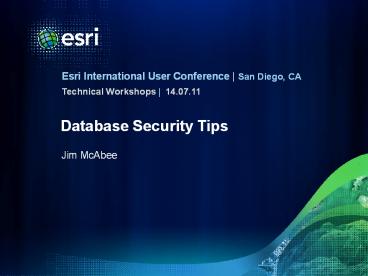Database Security Tips - PowerPoint PPT Presentation
Title:
Database Security Tips
Description:
14.07.11 Database Security Tips Jim McAbee * * * * * * * * * * * * Agenda Geodatabase Security: Users and Roles Authentication Authorization and Limiting Access ... – PowerPoint PPT presentation
Number of Views:285
Avg rating:3.0/5.0
Title: Database Security Tips
1
Database Security Tips
- 14.07.11
- Jim McAbee
2
Agenda
- Geodatabase Security Users and Roles
- Authentication
- Authorization and Limiting Access
- Geodatabase Security Granularity
3
Geodatabase Security
4
IT Security Many Levels
3rd Party
5
Authentication Methods and Authorization
- Authentication vs. Authorization
- Authentication who is allowed
inAuthentication is the process by which a
system verifies a user's identity - Authorization or Privileges what they can
doAuthorization indicates which database
operations that user can perform, and which data
objects that user can access and/or manipulate. - Authentication Methods
- Database
- External Local OS, Domain, other (e.g. LDAP,
etc..) - Cross-OS possible typically but complex
- Authorization or Privileges
- Object Creation (DDL Data Definition)
- Object Manipulation (DML Data Manipulation)
6
Database Architecture and Authorization
Differences
- Single vs. Multiple Database per Instance
Architectures - Instance vs. Database level privileges and roles
Instance
Instance
Database
Database
schema
schema
schema
schema
schema
schema
schema
schema
Database
schema
Oracle
schema
schema
schema
SQL Server, DB2, Postgres
7
Levels of Authorization
- Instance vs. Database level
8
Few notes on external authentication
- Implementation very database dependent favored
by some, not by others - e.g. Oracle - remote_os_authent true could
pose possible security issues allowing other
machines an access point if they know user name,
thus per Oracle 11gr2 Doc it is poor security
practice to use this feature. - SQL Server windows or mixed-mode
- DB2 Authentication of a user is completed
using a security facility outside of the DB2
database system. The security facility can be
part of the operating system or a separate
product. DB2 9.7 Documentation - Be aware of limitations (help.arcgis.com)
9
Authorization and Policies
10
Authorization/Privileges
- DDL vs. DML Creation vs. Maniuplation
- Creation create table, view, trigger, function,
etc.. - Manipulation select, insert, update, delete
- Management of by Database vs. Geodatabase
- Feature Classes and Tables - RDBMS
- Feature Datasets, Versions and Behaviors
ArcGIS
ArcGIS
Geodatabase AdministrativeSchema
(Behaviors/Privileges)
SQL
RDBMS Privileges and Constructs (Privileges/Views)
11
Users - Considerations
- User Types
- System
- General vs. Specific (head-less vs. employee)
- Editor, Viewer (service specific?), Departmental,
Operations, etc. - System Roles
- Public
- other
- Locked/Unlocked accounts
- inactivity
- Password Timeout
- automatic
- organization policy
- User or Role based resource management
- space, cpu, etc
12
Other Database Level Security methods
- Row Level Security
- Views and Procedures
13
View based RLS
- Database implementation or custom (attribute)
- Do not confuse with some database specific row
level security implementations. - Geodatabase features are synonymous with RDBMS
rows - Feature level security is based on the concept of
adding a column to a table that assigns a
sensitivity level for that particular row. - Simple Feature Classes/Layers
- Versioned Feature Classes require more
customization (A and D tables)
14
Row-Level Security in Oracle
- Terminology
- VPD (Virtual Private Database)
- Fine-Grained Access Control (FGAC)
- Oracle Label Security
- Dynamic predicate for a table or view is
generated by a PL/SQL function associated with a
security policy through the DBMS_RLS package. - Requires selective and carefulimplementation
- Recommended use on simplefeature classes
- Not formally supported
- vvpd_policy, sys.rls to view existing policies
15
Row Level Security in OracleLimiting access to
feature attributes
- Policy determines what features users can query
- Behavior may or may not be desired behavior (e.g.
all zoning types shown in TOC)
dbms_rls.add_policy('giseditor','zoning','accessco
ntrol_zoning','sec_admin','f_policy_zoning',policy
_type gt dbms_rls.context_sensitive)
16
Security Tips and Tricks - Users
- Setup Data Owners as Head-less organizational
users - type of data, departmental, application
- Consider generic read-only/viewing users for
various services or groups of services - can allow for finer granularity of load and
performance monitering within database if all
services are on same servers - can also allow for finer granularity of auditing
if that is desired - Consider enhancing workflow enforcement through
implementation of Workflow Manager (JTX)
17
Thank You
- http//www.esri.com/sessionevals
18
Database Origins































